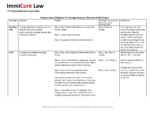Spouses of U.S. citizens are deemed “Immediate Relatives.” As such there are no per country limitations on the availability of an immigrant visa. There are 3 options for a U.S. citizen to sponsor their foreign spouse:
Spouse
The U.S. citizen must submit evidence of citizenship such as Birth Certificate, Naturalization Certificate, U.S. Passport, etc. The U.S. citizen will also provide an Affidavit of Support. Sometimes a joint financial sponsor may be required. The foreign spouse provides evidence of their birth certificate.
The couple also submits evidence of their marital relationship including their marriage certificate and other evidence that the marriage is bona fide.
At the time of filing, the foreign spouse can also apply for interim benefits such as an Employment Authorization Document (EAD) and Advance Parole (AP). The foreign spouse should not travel while the case is pending unless they have advance parole or are on an H-1B or L-1 visa, otherwise the application will be deemed abandoned. The foreign spouse will receive an appointment for biometrics.
Interview: The couple then attends an interview with a local USCIS immigration officer. The foreign spouse must submit a medical exam either when filing the case, in response to a request for evidence, or at the time of the interview. If approved, a Green Card will be mailed to their U.S. address.
Resources: Please see flowchart below.
Stage 1: I-130 Petition with USCIS. The U.S. spouse files an Immigrant Petition (Form I-130) with USCIS. In support the U.S. citizen submits evidence of citizenship such as Birth Certificate, Naturalization Certificate, U.S. Passport, etc. The couple also submits evidence of their marital relationship including their marriage certificate and other evidence that the marriage is bona fide. Once the case is approved the case is transferred to the National Visa Center (NVC) for Stage 2.
Stage 2: Immigrant Visa Application with National Visa Center. The foreign spouse submits online a completed Form DS-260, along with their civil documents, and the U.S. citizen spouse submits an Affidavit of Support. The NVC will then transfer the case to a U.S. Consulate.
Stage 3: Consulate Interview. The U.S. citizen spouse is not required for this. The foreign spouse will get their fingerprints and medical exam done prior to the interview. After a successful interview an immigrant visa is stamped into the petition. The foreign spouse should travel to the U.S during the pendency of the immigrant visa, at which point the foreign spouse will become a Lawful Permanent Resident upon entering the U.S. and a Green Card will be mailed to their U.S. address.
Resources: Please see flowchart below.
For foreign spouses that are outside of the U.S. you can file for a K-3 instead of the Immigrant Visa Consular Processing described above. Under this option the foreign spouse enters on the K-3 Nonimmigrant Visa and then files for Adjustment of Status in the U.S.
The K-3 is in some ways becoming obsolete since it was originally developed. Its purpose was to cut down on the long processing times for I-130 petitions, but those processing times are now similar to the K-3 process.
The K-3 works as follows:
Stage 1A: I-130 Petition with USCIS. The U.S. spouse files an Immigrant Petition (Form I-130) with USCIS. In support the U.S. citizen submits evidence of citizenship such as Birth Certificate, Naturalization Certificate, U.S. Passport, etc. The couple also submits evidence of their marital relationship including their marriage certificate and other evidence that the marriage is bona fide.
Stage 1B: I-129F Petition with USCIS. Once the I-130 is received by USCIS and a Receipt Notice is issued, then the I-129F K-3 petition is filed with USCIS. Typically you can re-submit all of the same supporting evidence that was filed for the I-130.
Stage 2: Consular Processing. If the I-129F is approved before the I-130, the case will be transferred to a U.S. consulate in the country where the marriage took place. The US Consulate will then send the foreign spouse a list of required documents. These are similar to the documents collected above in the NVC Stage for the Immigrant Visa Consular Processing. The Consulate will then schedule an interview and the foreign spouse is required to have biometrics and a medical examination. If the K-3 is approved, the foreign spouse will receive a non-immigrant K-3 visa and use this to enter the U.S.
Stage 3: Adjustment of Status. After the foreign spouse enters the U.S. on a K-3 an adjustment of status application can be filed, and interim benefits such as an Employment Authorization card (EAD) and a Advance Parole (Travel Document) may also be sought. Since the Medical Exam was already done, only a Vaccination Record is submitted at this stage.
Stage 4: Interview. The couple then attends an interview with a local USCIS immigration officer. If approved, a Green Card will be mailed to their U.S. address.
Note, K-3 Case may be deemed unnecessary: If I-130 & I-129F are approved at same time, the need for, a nonimmigrant K-3 visa ends. In which case, the K-3 case will be administratively closed, and the case would then proceed as an Immigrant Visa Consular Processing case as described above. The USCIS routinely approves these cases at or near the same time, which is why the K-3 option is often rendered unnecessary.
Resources: Please download our Procedures Overview below for more information. Please also visit our resource pages in the tabs above for more information about the Affidavit of Support.




